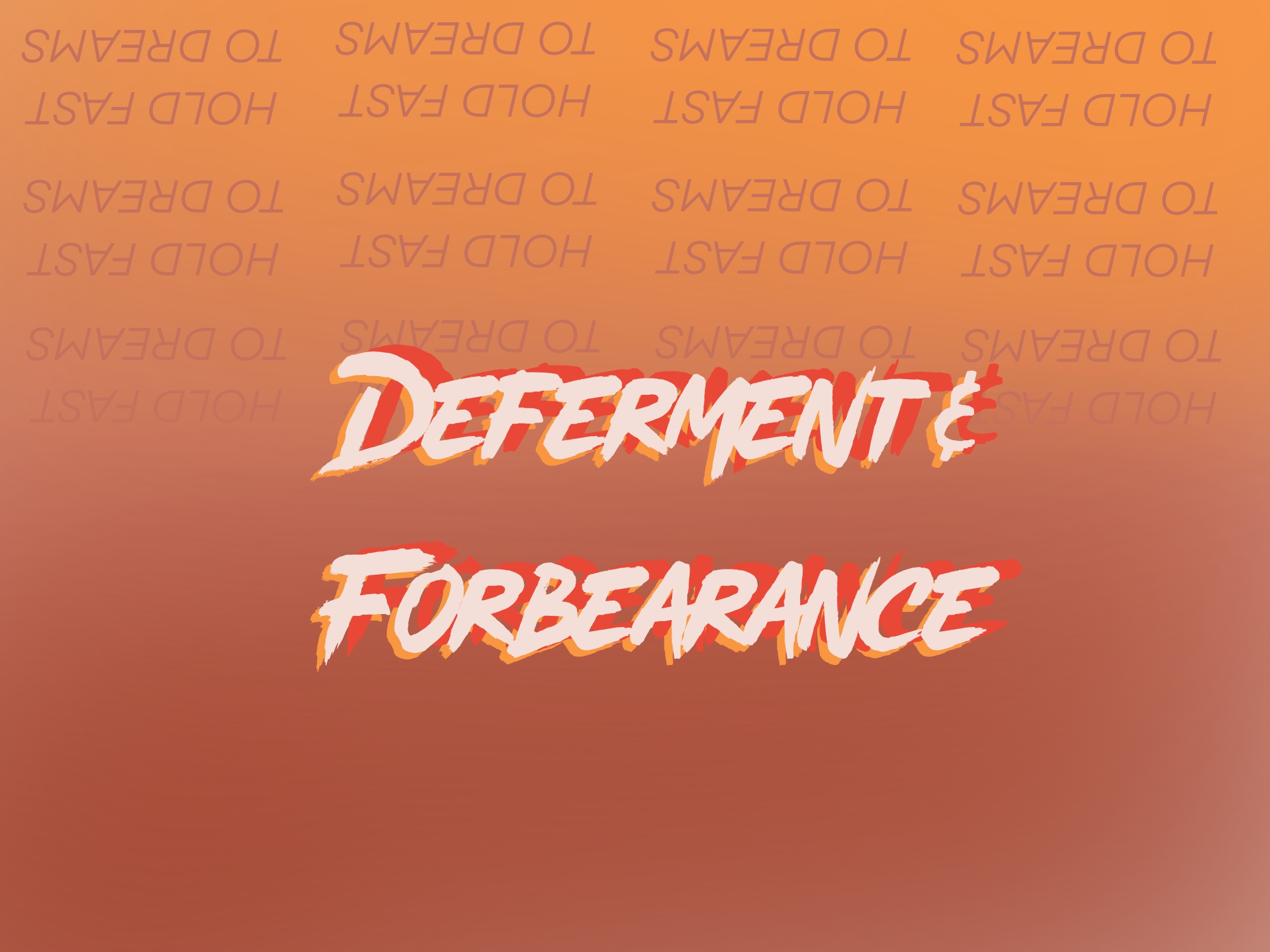Under certain circumstances, you can receive a deferment or forbearance that allows you to temporarily postpone or reduce your federal student loan payments. Postponing or reducing your payments may help you avoid default.
You’ll need to work with your loan servicer to apply for deferment or forbearance; and be sure to keep making payments on your loan until the deferment or forbearance is in place.
What is deferment?
A deferment is a period during which repayment of the principal and interest of your loan is temporarily delayed.
What happens to my loan during deferment?
During a deferment, you do not need to make payments. What’s more, depending on the type of loan you have, the federal government may pay the interest on your loan during a period of deferment.
The government may pay the interest on your
- Federal Perkins Loan,
- Direct Subsidized Loan, and/or
- Subsidized Federal Stafford Loan.
The government does not pay the interest on your unsubsidized loans (or on any PLUS loans). You are responsible for paying the interest that accrues (accumulates) during the deferment period, but your payment is not due during the deferment period. If you don’t pay the interest on your loan during deferment, it may be capitalized (added to your principal balance), and the amount you pay in the future will be higher.
Am I eligible for a loan deferment?
The following table provides situations that may make you eligible for a deferment of your federal student loan.
|
Situations When You May Apply for Deferment |
Deferment Available? (and for how long, if applicable) |
||
|---|---|---|---|
|
Direct Loans |
FFEL loans |
Perkins Loans |
|
| During a period of at least half-time enrollment in college or career school |
Yes |
Yes |
Yes |
| During a period of study in an approved graduate fellowship program or in an approved rehabilitation training program for the disabled |
Yes |
Yes |
Yes |
| During a period of unemployment or inability to find full-time employment |
Yes (for up to 3 years) |
Yes (for up to 3 years) |
Yes (for up to 3 years) |
| During a period of economic hardship (includes Peace Corps service) |
Yes (for up to 3 years) |
Yes (for up to 3 years) |
Yes (for up to 3 years) |
| During a period of service qualifying for Perkins Loan discharge/cancellation |
No |
No |
Yes |
| During a period of active duty military service during a war, military operation, or national emergency |
Yes |
Yes |
Yes |
During the 13 months following the conclusion of qualifying active duty military service, or until you return to enrollment on at least a half-time basis, whichever is earlier, if
|
Yes |
Yes |
Yes |
If you are a Direct Loan or FFEL Program borrower who has a loan that was first disbursed (paid to you or on your behalf) before July 1, 1993, you may be eligible for additional deferments for such situations as teaching in a teacher shortage area, public service, being a working mother, parental leave, or temporary disability. For more information, contact your loan servicer.
How do I request a deferment?
Most deferments are not automatic, and you will likely need to submit a request to your loan servicer, the organization that handles your loan account. If you are enrolled in school at least half-time and you would like to request an in-school deferment, you’ll need to contact your school’s financial aid office as well as your loan servicer.
Your deferment request should be submitted to the organization to which you make your loan payments.
- Direct Loans and FFEL Program loans: contact your loan servicer
- Perkins Loans: contact the school you were attending when you received the loan
What is forbearance?
If you can’t make your scheduled loan payments, but don’t qualify for a deferment, your loan servicer may be able to grant you a forbearance. With forbearance, you may be able to stop making payments or reduce your monthly payment for up to 12 months. Interest will continue to accrue on your subsidized and unsubsidized loans (including all PLUS loans).
There are two types of forbearances:
- Discretionary
- Mandatory
Discretionary Forbearance
For discretionary forbearances, your lender decides whether to grant forbearance or not.
You can request a discretionary forbearance for the following reasons:
- Financial hardship
- Illness
Mandatory Forbearance
For mandatory forbearances, if you meet the eligibility criteria for the forbearance, your lender is required to grant the forbearance.
You can request a mandatory forbearance for the following reasons:
- You are serving in a medical or dental internship or residency program, and you meet specific requirements.
- The total amount you owe each month for all the student loans you received is 20 percent or more of your total monthly gross income (additional conditions apply).
- You are serving in a national service position for which you received a national service award.
- You are performing teaching service that would qualify for teacher loan forgiveness.
- You qualify for partial repayment of your loans under the U.S. Department of Defense Student Loan Repayment Program.
- You are a member of the National Guard and have been activated by a governor, but you are not eligible for a military deferment.
How do I request a forbearance?
Receiving loan forbearance is not automatic. You must apply by making a request to your loan servicer. In some cases, you must provide documentation to support your request.
What happens to the interest on my loan during forbearance?
Interest will continue to be charged on all loan types, including subsidized loans.
You can pay the interest during forbearance or allow the interest to accrue (accumulate). If you don’t pay the interest on your loan during forbearance, it may be capitalized (added to your principal balance), and the amount you pay in the future will be higher.

You MUST continue making payments on your student loan until you have been notified that your request for deferment or forbearance has been granted. If you stop paying and your deferment or forbearance is not approved, you will become delinquent and you may default on your loan.
Do I have options besides deferment or forbearance?
Always contact your loan servicer immediately if you are having trouble making your student loan payment. If you don’t qualify for deferment or forbearance, you may be able to change your repayment plan. There may be a repayment plan that offers lower payments than you’re currently making.

